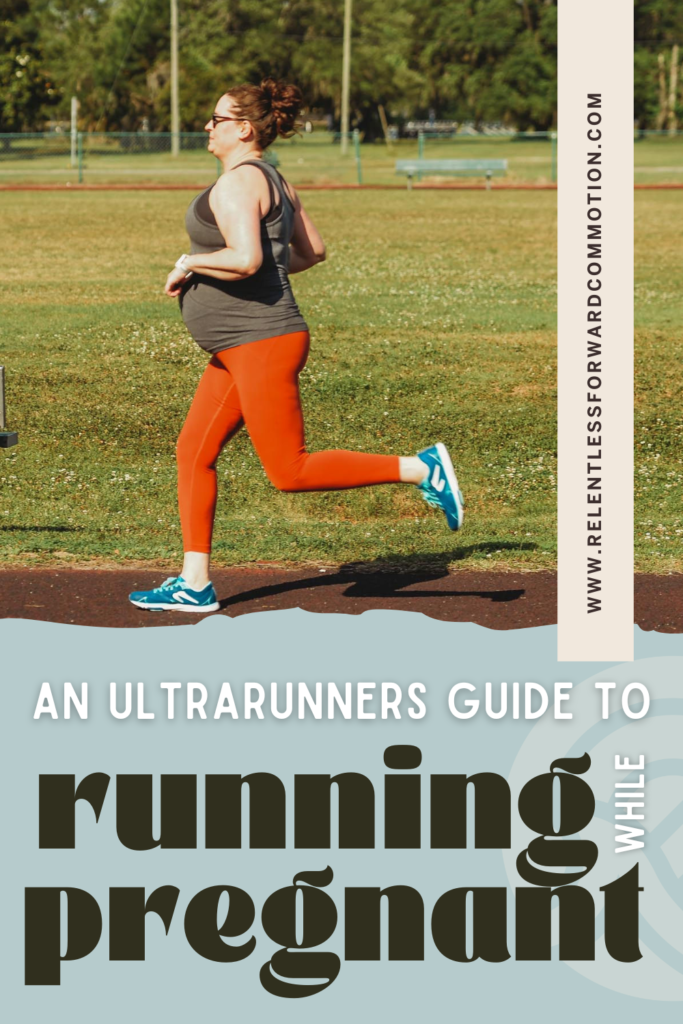Last Updated on July 31, 2023 by Heather Hart, ACSM EP, CSCS
The following post was written by accomplished ultrarunning mom, Maggie Seymour. Maggie is a certified RRCA Level II running coach, USATF Level I track and field coach, ACE certified personal trainer, Health Coach, and pre/post-natal fitness instructor.
Maybe you’ve just found out you were expecting, maybe you’re thinking about maybe trying to get pregnant. Whether its your first or your sixth pregnancy you may wondering what you have to “give up” in order to have a safe, healthy, and joyful pregnancy. You may be wondering if your weekly runs are on that list.
If you’re like me, you may also be overwhelmed with the deluge of information – often unclear, unscientific, and conflicting regarding pregnancy in general. So here’s a helpful guide to running (yes even ultras) while pregnant.

Disclaimer: This article is provided for informational purposes only. Please consult your doctor regarding any medical questions or concerns you may have about running while pregnant, in order to obtain more specific information to address your health and safety needs.
Running While Pregnant: Is it Safe?
Assuming an otherwise healthy pregnancy and no underlying health concerns which would prevent you from running with or without child, running while pregnant is absolutely considered safe. There is no reason to hang up your running shoes for 40 weeks, if you don’t want to.
In fact, exercise during pregnancy has been linked to a bevy of health benefits for mom and baby to include lower risk of gestational diabetes, lower rates of cesarean deliveries, and lower blood pressure for mom.
How do I know if I should run while pregnant?
Of course, every body and every pregnancy is different. If you’re wondering if you should run during your pregnancy, first ask yourself “Do I feel like it?” Physically, mentally, and emotionally?
If the answer is yes, then talk to a doctor you trust.
Be honest with them and have a discussion regarding the specific risks and benefits of your specific pregnancy. Assuming no complications, most doctors will give you the go ahead to continue running at your current levels.
Can You Run an Ultramarathon While Pregnant?
With pregnancy and ultras the answer to so many questions (including this one) is, you guessed it, “it depends.” Pregnant women have and will continue to run ultras while pregnant.
Does that mean every woman can and should plan a 50k or longer with a baby on board? Absolutely not. Every woman is different. Every pregnancy is different.

For example, during my first pregnancy I ran across four states (ok one was Rhode Island). During my second? I think I knocked out a local 5k shuffle.
My body felt different for each one. My base level of fitness (and weight) were different for each one. I was (slightly) older and (way more) tired for my second pregnancy. They occurred at different points in my career, not to mention at different times during a global pandemic.
So, should I start running while pregnant?
Anyone who has trained for an ultramarathon will tell you – it’s grueling. Meaning pregnancy may not be the best time to start a high-intensity, high mileage training plan, but that doesn’t mean it’s not a great time to start exercising.
In fact, Pregnancy is a wonderful reason to take stock of your overall health. Growing humans is serious business and it is never too early (or too late) to nourish and prepare your body for gestation, labor, delivery, and the postpartum period.
Pregnancy is a great time to start incorporating daily walks, jogs, and exercise into your schedule. Much like finding a doctor whom you trust, a certified prenatal running coach who understands your specific needs and goals may be exactly what you need to continue running through pregnancy and beyond.
Risks, Myths, and Facts of Running While Pregnant
That doesn’t meant there aren’t risks. There are always risks to running any distance – injuries, burnout, falls. Of course these risks get a little scarier, and sometimes more likely as you move through your pregnancy.
Myth: Running while pregnant will bounce or otherwise hurt a growing fetus.
Fact: Babies are snug in an amniotic sac throughout pregnancy, meaning the most likely effect of even the bounciest of runs is a gentle rocking to sleep.
Myth: Running while pregnant will inevitably cause an injury.
Fact: One of the key changes in body chemistry during pregnancy is the increase in relaxin. Relaxin does exactly what it sounds like, relaxes the joints, muscles, and ligaments of the body.
Flexibility is critical to supporting a growing fetus and even more critical in the labor process, allowing our bodies to open to allow for delivering our bundles of joy. This increased relaxin can put our joints and ligaments at more of a risk of strain or injury.
On top of that, increased weight can put additional load on our critical joints, further risking injury. Likewise as our hips widen and our center of gravity changes, which can lead to more stumbles and falls.
So yes, there are additional injury concerns for pregnant runners, but injury isn’t inevitable and it is more than possible to run, injury-free thoughout your pregnancy.

Myth: Running while pregnant will ruin your pelvic floor, and cause uterine prolapse down the road.
Fact: Attention to our pelvic floors prior to, during, and after pregnancy is an essential component of maternal health, and unfortunately one that is so often minimalized or disregarded entirely.
It’s true, pregnancy can wreak havoc on our pelvic floors, and running, especially running with poor form, can add to that havoc. In some cases, this can leave to incontinence, sexual dysfunction, and yes even prolapse.
This is, in part, due to that relaxin release. Running increases the pressure on our core muscles and pelvic floors, which can make those muscles and ligaments ever weaker.
Runners, however, often have the opposite problem – our pelvic floors tend to be too tight, which can also make for weak and tired muscles and ligaments.
Don’t worry, when the right form and attention we can mitigate these risks and even correct existing problems with our pelvic floors, preparing for a healthy pregnancy, birth, and post-partum experience.
Myth: Running Causes Miscarriages.
Fact: If your doctor has cleared you for running, there is no reason to believe running (or any exercise) will lead to a miscarriage.
There is some research that suggests that high intensity exercise may interfere with the implantation of the blastocyst or even cause subclinical miscarriages. That is to say, if timed right it may prevent you from becoming pregnant or cause a miscarriage in the earliest days, or before a doctor has confirmed the pregnancy.
So if you have a history of miscarriages or difficulties getting pregnant, you may opt to take a cutback weeks during ovulation and prior to your first ultrasound.
The Benefits of Running Through Your Pregnancy
Overall, in a healthy uncomplicated pregnancy, the risks of running while pregnant are vastly numbered by the benefits. As mentioned, exercise has been linked to any number of positive outcomes during and post pregnancy, the least of which isn’t the overall happiness and wellbeing of mom.
If you’re a runner, you’ve likely recognized the health and wellness benefits from your weekly runs. If you’re an outdoors or trail runner, you have the added benefit of nature. The impacts of our flora, fauna, and fresh air cannot be overstated. Here are a few tips to maximize the benefits of pregnant running, and minimize those risks.
Tips for Running Throughout your Pregnancy:

Make Hydration and Nutrition a Priority.
Keep an eye on your hydration and nutritional needs. While you don’t need to “eat for two” while you’re pregnant, you do need around 300 extra nutrient dense, mineral rich calories a day.
You may find you need to increase your fiber intake to combat constipation (oh yeah, that’s a symptom).
You’ll also need to replenish the calories you burn during a run or cross-training session. Pregnancy is not the time to try and run a calorie deficit.
Likewise you’ll want to stay hydrated throughout the pregnancy to help aid in digestion, reducing swelling, and adds to the general health of mom and baby. Did I mention it also helps keep your poops soft and regular?
Run by RPE – not HR zones or pace.
The advice for exercising while pregnant used to keep the HR below 140 BPM, but any doctor or coach worth their salt will tell you that’s outdated guidance that didn’t take into consideration current fitness levels or physiological changes that occur during pregnancy.
Most doctors will now recommend exercising at a moderate intensity and listening to your body’s cues for when to back off, slow down, or stop altogether. One of the most important skills to learn in ultrarunning and pregnancy is how to listen to your body.
During both, the body does all sorts of weird things, odd or new sensations that send us running to google.
Information is great, but some of the best information comes from our own intuition. We’ve been living, moving, and running in our bodies for our entire lives, we know our own limbs and lungs better than anyone, and now is as good a time as ever to start trusting ourselves.
Now, let’s break it down by trimester, helpful tips and “heads up” about running while pregnant.
Tips for Running in Your First Trimester
Prior to getting pregnant you may think running during the first trimester will be more or less like running sans baby. You may be right. There’s no real discernable “baby bump” and weight gain is typically minimal (or you may even lose weight!). You may also be very wrong. The human body is hard at work during that first trimester, preparing both your body and the one you’re growing for a mind boggling 40 weeks.
Which means the first trimester of pregnancy looks different for everyone. Some folks can barely hold down juice with constant morning sickness. Others luckily avoid the nauseous but are met with persistent fatigue.

Other symptoms include lightheadedness, shortness of breath, and stuffy nose. This is because your diaphragm increases in size and moves up into the chest cavity while your lung capacity (the amount of air the lungs can breathe in and out) decreases.
Don’t worry, you’re getting enough oxygen because your blood volume is also increasing to compensate for these respiratory changes.
Still it can feel really scary to experience these symptoms so early in a run. If you’re one of the lucky ones who get the benefits of this increased blood flow without the correlating respiratory symptoms, kudos, running may actually seem easier during these first few months.
I was around seven weeks pregnant when I headed out to run across Rhode Island, New York, and Pennsylvania and was shocked at how quickly I felt so spent. Like so many other women, I discovered these symptoms were worse in the morning, so I switched my runs to the evening.

If you’re typically a run before breakfast kind of person, try switching it up. Heat can also exacerbate these symptoms so if you’re a southern runner, it may be time to log some treadmill miles.
Wherever and whenever you decide to run, make sure to bring water, even if you’re not “going very far.” You may have already noticed how thirsty you seem to be during pregnancy, and that’s simply your body’s way of telling you that it needs extra water for the week ahead.
Last, but certainly not least, be safe. Those feelings of lightheadedness and increased heart rate are normal, but they’re also likely indicators to slow down, breathe deep, or take a walk break. One of the most underrated skills in ultrarunning is walking, now is a perfect time to practice.
Now is also a great time to incorporate some pregnant friendly core work into your plan. This does mean you should start your day with 100 crunches. On the contrary, dedicated core work should be a mix of yoga positions, running posture, and belly breathing.
Go see a Pelvic Floor PT immediately after your first pregnancy test, or if the pregnancy is planned, before. Complete these exercises religiously and your body will thank you later.
Wait! What about kegels? Kegels are great for strengthening the pelvic floor muscles, and generally recommended for first and second trimesters, but as we mentioned runners often have tight pelvic floor muscles and may actually need a different approach. So go see that Pelvic Floor PT!
Tips for Running in Your Second Trimester
Many pregnant runners find that second trimester to be the sweet spot for exercise. All those funky symptoms of early pregnancy are gone, but that little bump isn’t quite enough to slow you down just yet. So if it feels good, lace up those sneakers and hit your favorite trails. Keep focusing on RPE, and if it helps, turn off your strava sync. You don’t HAVE to share every run with the world.
Or turn it on and feel the support from your fellow runners. Again, whatever works for you.

Keep up on those pelvic floor exercises. Focus on lifting during inhaling and letting go during the exhale, both while running and throughout the day. This gets a bit harder in the second trimester but if you were diligent about your belly breathing exercises during the first trimester, you’ll find this take a little less effort and focus. Regardless of when you started, this focused breathing during your second trimester is critical to pelvic floor health. It’s also a great way to start prepping for a vaginal delivery.
You may start to show during your second trimester, which means the very personal journey of pregnancy has gone public. Everyone loves to give pregnant folks advice, solicited or otherwise. Much of this advice comes from a good place, pregnancy is exciting, scary, and difficult and fellow parents will want to join in that joy and help in any way they can.
While much comes from the heart, most of it also comes from personal experience – which means it may not be the right (or welcomed) advice for you, your pregnancy, or your priorities. Feel free to politely (or impolitely) cut off this stream of advice however you see fit.
Tips for Running in Your Third Trimester
If you were lucky enough to avoid the public comments on running while pregnant during your last trimester, you may start hearing them now. As always, trust your doctor and trust yourself.
Running during this last period of your pregnancy may not be right for you, or it may be the only thing that keeps you sane, and if your doctor gives you the go ahead, there is no reason why you can’t keep logging the miles.

Of course your growing bump (and breasts) may make for harder runs. They may also require some new running gear. Make sure you’re sizing up and invest in a supportive sports bra.
If you’re planning on nursing aftwards, go ahead and try out some sports bras specifically designed for nursing and pumping running. While you’re at it, load up on some anti-chafe too. You can never have too much lube! Finally, if you feel like you need it, grab a belly band to help support your midsection, especially if you start to struggle with round ligament pain.
Related post: Running And Breastfeeding: 10+ Tips For Ultrarunning Moms
The risk of falling also increases during the third trimester as your center of gravity changes. This is where I advise most pregnant athletes (especially those who are clumsy like me) to move off the trails and to the flatter roads, tracks, and treadmills.
During this last phase of pregnancy you’ll likely want or need to scale back on your runs, and that’s ok. You may decide to enjoy the new found freedom of a lazy Saturday morning, spending that time connecting with your partner, older children, or yourself. Or you can replace those long runs with long walks and of course belly breathing and your approved pelvic floor work.
Ultrarunning while pregnant – Final Thoughts
Ultimately no matter how you address running in your pregnancy, whether you’ve maintained high mileage weeks, shuffled through a local 5k, or canceled all your training plans until your little one arrives – you’re still a runner.
Our running (and motherhood) journeys all look different, we have different highs and lows, sprints and walks. We are not defined by our personal bests, our personal worsts, our longest runs, or our longest dry spells.
If you’ve been advised to take it easy during your pregnancy, please listen to your doctor. Just because the runner on instagram is knocking out marathons during her third trimester doesn’t mean you need to, or should.
The trails are there and they’ll be waiting for you to return, at whatever level, when you, your body, and your family is ready. And your other family, your running family, we’ll be here too.
Heather Hart is an ACSM certified Exercise Physiologist, NSCA Certified Strength and Conditioning Specialist (CSCS), UESCA certified Ultrarunning Coach, RRCA certified Running Coach, co-founder of Hart Strength and Endurance Coaching, and creator of this site, Relentless Forward Commotion. She is a mom of two teen boys, and has been running and racing distances of 5K to 100+ miles for over a decade. Heather has been writing and encouraging others to find a love for fitness and movement since 2009.

Leave a Reply